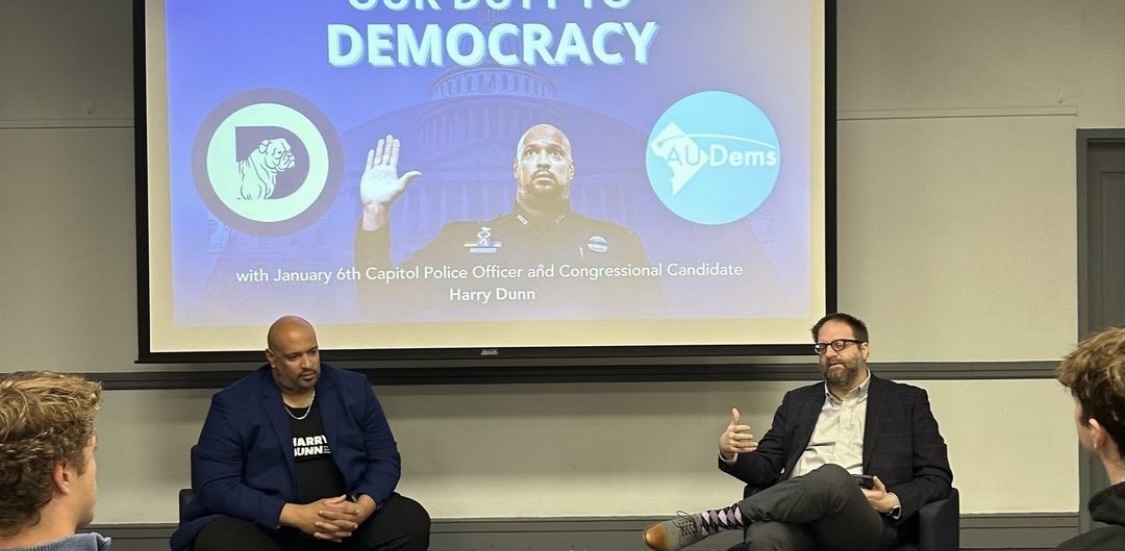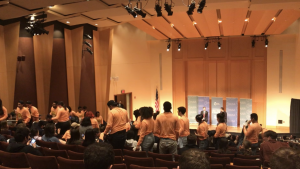Trigger warning: brief depictions of violence, and mention of racial slurs
Students from Georgetown and American University gathered on March 21 as College Democrats from both universities co-hosted an event featuring Harry Dunn, a former Capitol Police officer and current congressional candidate in Maryland. In a conversation moderated by Hans Noel, an associate professor in Georgetown’s department of government, Dunn reflected on his time as a Capitol Police officer, told his story of what happened on Jan. 6, and discussed why he feels called to run for office.
From 2009 to 2023, Dunn served as a first responder at the exterior of the Capitol Building, as well as a member of the U.S. Capitol Police (USCP) crisis negotiation team.
On Jan. 6, 2021, when supporters of former president Donald Trump stormed the U.S. Capitol, Dunn was stationed on the perimeter of the Capitol building. Despite the nearly 15 years of experience in USCP, he never expected that day to spiral into a violent riot.
“We thought that it was going to be a peaceful protest. [It] could have been contentious, but we didn’t think that was going to happen,” Dunn said. “Somebody was sending me screenshots from right wing media sites, [that said] ‘Hey, we’re breaching the Capitol, bring your weapons,’ and [I thought,] ‘Whatever, nobody’s coming, nobody’s going to breach the Capitol. I have more faith in humanity than that.’”
Dunn realized that the protests were spiraling out of control when he received a call via his radio from another officer.
“An officer, a person that I trained when they first got with the department, was screaming into the radio, ‘Send us help, send us help! We are surrounded,’” Dunn said. “She went silent after that. And that’s when we saw on the video that she got attacked. And that’s where the breach of the outer perimeter first happened.”
After the mob breached the Capitol, Dunn was stationed to guard Rep. Nancy Pelosi’s office, as well as protect other injured officers. Dunn proceeded to fight off insurrectionists and defend the Capitol for nearly seven hours, all while they screamed anti-Black racial epithets at him. At the end of the day, he said, his hands were bloodied from throwing punches at the rioters.
Over 140 USCP officers were injured by rioters on Jan. 6, and one died that day.
After witnessing the events of Jan. 6, Dunn felt called to tell people what he saw. He advocated for the creation of the Jan. 6 Committee to investigate the causes of the insurrection and who should be held responsible.
Dunn worked alongside D.C. Metro Police Officer Michael Fanone, who was deployed to the Capitol and injured on Jan. 6, and Gladys Sicknick, mother of USCP officer Brian Sicknick, who suffered two strokes during the insurrection and died the next day.
“We went around and lobbied members of the U.S. Senate to get them to have a 9/11-style, bipartisan commission,” Dunn said. “We did change a lot of minds trying to form that commission.”
He would later testify in front of that very committee, alongside Fanone, while continuing to call for accountability for insurrectionists and the former President.
In 2023, Dunn resigned from the U.S. Capitol Police. Part of his motivation, he explained, was to engage in greater political advocacy, something that restrictions on media engagement from his job limited. He felt the urgency of this work outweighed the risks.
“I retired four years short of being able to collect the full pension from the government,” Dunn said. “Big deal, right? Why not wait four more years? Who the hell knows what our country will look like in November? Do we have four years to wait?”
After Rep. John Sarbanes announced his retirement, Dunn decided to enter a crowded Democratic primary to run for the open congressional seat in Maryland’s third district. A major motivation for his campaign, which he announced just a day short of the three-year anniversary of the insurrection, was to continue to fight for accountability around Jan. 6.
“January 6, the question wasn’t ‘Do I speak up,’ it was, ‘Who do I talk to right now?’ I wouldn’t have been able to live with myself if I didn’t speak up,” Dunn said.
When Dunn decided to run, he turned to the relationships he’d made in congress to help begin his campaign.
“Being up in the Capitol 15 plus years, I made a lot of relationships up there. And after January 6, I made a lot more friendships. Cool fact: I can go knock on Nancy Pelosi’s door anytime, and she will clear her schedule and let me come and sit on her couch and drink colas and talk about whatever the hell I want,” Dunn said. “I’m blessed to have those relationships with people. Once I made the decision to run, I knew that I could talk to people and say, ‘Hey, I don’t know what the hell I’m doing—point me towards somebody who does.’”
At the Q&A session at the end of the event, students asked Dunn what his largest priorities would be in Congress. Dunn plans to focus on systemic criminal justice reform, given his perspective as a Black man with a career in law enforcement.
“Why do people of color communities not like the police? They don’t trust those institutions, because they’ve seen them fail so many times. So the people in charge have to earn that trust back,” Dunn said. “Fixing those institutions is the best way to go. But the bottom line is, people don’t have faith in these institutions.”
According to a study by the Harvard School of Public Health, Black Americans are 3.23 times more likely to be killed by police than white Americans. In 2019, 84% of Black adults told Pew Research Center that, in dealing with police, Black people are generally treated less fairly than white people.
Students also asked Dunn how he feels about Trump’s ongoing legal issues. When one student posed the question, “Could Jan. 6 happen again?” Dunn was frank.
“We’re still searching for accountability,” Dunn said. “There’s been nothing done to keep Donald Trump from doing that shit again. So that’s why it’s so important to fight—it can happen again, because there’s been nothing done to keep it from happening again. He thinks he’s gotten away with it.”
As the panel concluded, Dunn encouraged students to make their voices heard by voting in the upcoming 2024 elections.
“Everybody has a role to play in this. Every single person,” Dunn said. “Whether it’s serving on a jury, whether it’s voting, whether it’s registering a friend to vote, everybody has a role to play. But democracy is a verb. It’s not a spectator sport. We can’t sit on the sidelines.”





